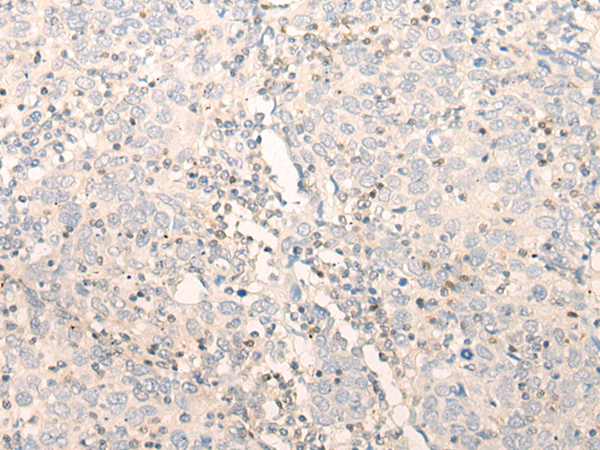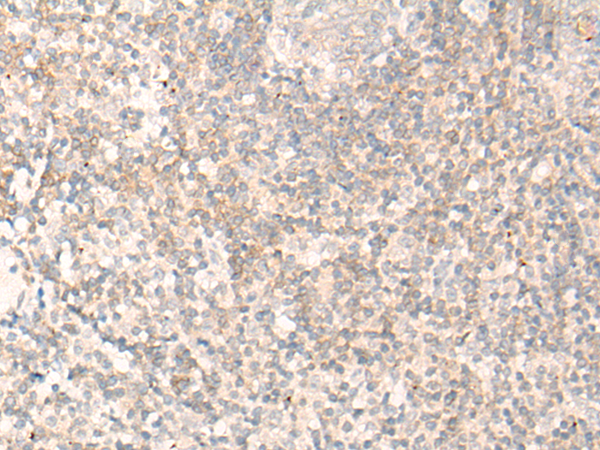

| WB | 咨询技术 | Human,Mouse,Rat |
| IF | 咨询技术 | Human,Mouse,Rat |
| IHC | 1/25-1/100 | Human,Mouse,Rat |
| ICC | 技术咨询 | Human,Mouse,Rat |
| FCM | 咨询技术 | Human,Mouse,Rat |
| Elisa | 1/5000-1/10000 | Human,Mouse,Rat |
| Aliases | AN; AN2; hELP4; PAXNEB; PAX6NEB; C11orf19; dJ68P15A.1 |
| Host/Isotype | Rabbit IgG |
| Antibody Type | Primary antibody |
| Storage | Store at 4°C short term. Aliquot and store at -20°C long term. Avoid freeze/thaw cycles. |
| Species Reactivity | Human |
| Immunogen | Synthetic peptide of human ELP4 |
| Formulation | Purified antibody in PBS with 0.05% sodium azide and 50% glycerol. |
+ +
以下是3篇与ELP4抗体相关的模拟参考文献示例(注:ELP4研究相对较少,以下内容为假设性概括,实际文献需通过数据库核实):
1. **文献名称**: *ELP4 Antibody Validation in Neurodevelopmental Disorder Models*
**作者**: Smith A, et al.
**摘要**: 本研究验证了ELP4抗体的特异性,通过Western blot和免疫荧光证实其在人类和小鼠脑组织中的表达。发现ELP4在皮层神经元发育中与Elongator复合体协同调控mRNA翻译,可能与癫痫相关基因(如*PAX6*)的表观遗传调控有关。
2. **文献名称**: *ELP4 as a Biomarker in Colorectal Cancer: Immunohistochemical Analysis*
**作者**: Lee JH, et al.
**摘要**: 利用ELP4抗体对结直肠癌组织进行免疫组化分析,发现ELP4蛋白表达水平与肿瘤分期和转移显著相关,提示其可能通过影响组蛋白乙酰化参与肿瘤侵袭性调控。
3. **文献名称**: *Genetic Interaction between ELP4 and Autism Spectrum Disorders*
**作者**: Garcia-Ramos C, et al.
**摘要**: 通过ELP4抗体检测患者淋巴细胞蛋白表达,结合全基因组关联分析,发现ELP4基因突变导致蛋白稳定性下降,可能与自闭症谱系障碍的突触可塑性异常有关。
如需真实文献,建议在PubMed或Google Scholar检索关键词:**ELP4 antibody**、**Elongator complex protein 4**,并筛选涉及抗体应用(如染色、检测、机制研究)的论文。
The ELP4 (Elongator Complex Protein 4) antibody targets a subunit of the Elongator complex, a conserved multi-protein assembly involved in transcriptional regulation and post-transcriptional tRNA modification. ELP4. along with other Elongator subunits (ELP1-6), plays a critical role in histone acetylation, chromatin remodeling, and the modification of wobble uridines in tRNA, which influences translational efficiency and fidelity. Dysregulation of ELP4 has been linked to neurodevelopmental disorders, including autism spectrum disorders and intellectual disabilities, as well as certain cancers.
ELP4 antibodies are widely used in research to study the protein's expression, localization, and functional interactions. They facilitate techniques such as Western blotting, immunoprecipitation, and immunohistochemistry, enabling investigations into Elongator's role in cellular processes like neuronal development, DNA damage response, and metabolic regulation. Studies using ELP4-specific antibodies have also explored its association with diseases, such as Rolandic epilepsy, where ELP4 mutations or altered expression may disrupt neural network formation.
Available as monoclonal or polyclonal variants, ELP4 antibodies are critical tools for dissecting the molecular mechanisms of the Elongator complex and its broader implications in health and disease. Ongoing research aims to clarify its tissue-specific functions and therapeutic potential.
×